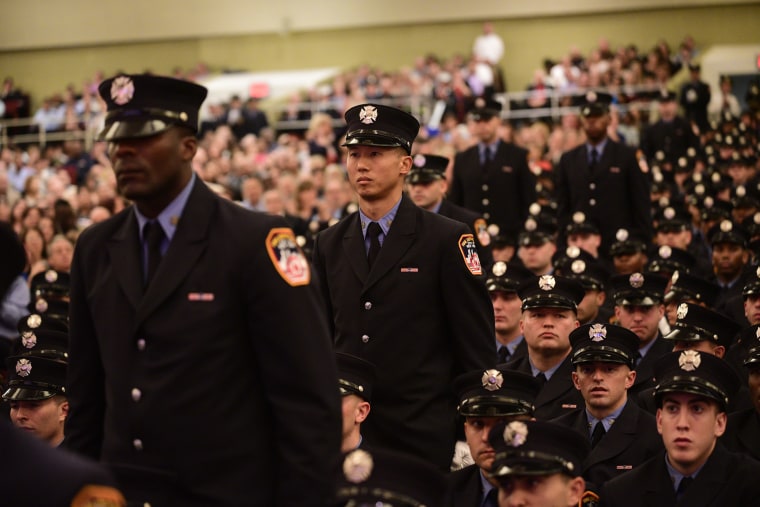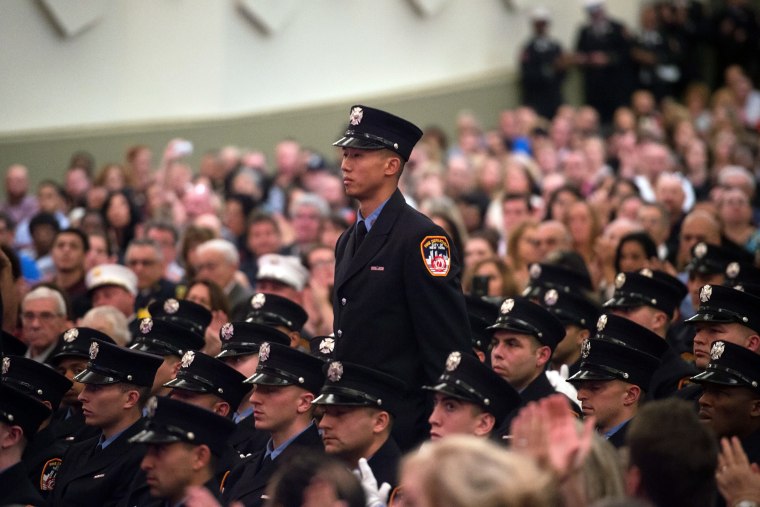Danny Chan knew he didn’t want to carry a gun anymore. That’s how he felt after returning home from two tours in Iraq with the U.S. Marines, despite having passed the test to become a New York City police officer in 2007.
But Chan, 31, still wanted to help people. Now, eight years later, Chan has gotten that chance as one of seven Asian-American firefighters who graduated last Friday from the New York Fire Department’s Fire Academy.

“I don’t think there can be anything more rewarding than saving somebody’s life,” Chan, one of 295 new FDNY probationary firefighters, told NBC News.
“Jobs like fire and police, you have to ask yourself whether or not you’re willing to put yourself in harm’s way to save someone you’ve never met before in your life."
Chan’s journey into the FDNY began in 2007, when he attended a job fair after completing his service with the Marine Corps. At the fair, Chan spoke with FDNY recruiters, but he missed the filing date for the city’s firefighter exam by two weeks, so he had to wait until 2011 to sit for the next one.
The same year he took that test, Chan landed a position with the Metropolitan Transportation Authority, working as a subway car inspector. This past June, Chan’s number on the firefighter list was called, prompting him to leave the MTA to begin the 18-week fire academy on June 29.
“It’s like a boot camp,” he said, comparing his experience training in the academy with that of the Marine Corps. “In certain aspects it’s harder. In certain aspects it’s not as hard.”
RELATED: Meet New York's Only Female, Asian-American Firefighter
One thing that made the fire academy easier for Chan was being close to his family in Brooklyn, where he was born and raised. He wasn’t sent away for 12 straight weeks as he was when he trained to be a Marine. But there were many challenges, Chan said, including a training segment called “mask appreciation,” in which recruits are sent into a smoke-filled building. At first, they enter without donning their air masks, which gives them a sense of what it’s like to breathe during a fire.
“You’re choking, your eyes start watering, your nose starts watering, your throat starts itching,” Chan explained.
Despite the dangers of the job, Chan’s parents—his father is an immigrant from Canton in southern China, his mother is from Hong Kong—completely supported their son becoming a firefighter. There was more pushback, however, when he told them he wanted to be a Marine at the age of 17, Chan recalled.
“They refused to sign the paperwork for me, and they told me I had to wait until I was 18,” Chan said.

Chan’s decision to join the 150-year-old FDNY comes at a time when the face of the department’s historically white firefighting force has begun to change. Efforts to diversify the department’s firefighter rank-and-file follows a lawsuit brought in 2007 by the U.S. Department of Justice, along with the Vulcan Society of black firefighters, which challenged the city’s use of two firefighter civil service exams found to have discriminated against black and Hispanic candidates.
That lawsuit was settled in 2014, resulting in about $98 million in backpay and benefits awarded to black and Hispanic firefighter applicants who sat for exams in 1999 and 2002, as well as in recruiting reforms to make the FDNY better resemble the city’s demographic makeup, according to the mayor’s office.
“I don’t think there can be anything more rewarding than saving somebody’s life."
While Asian Americans still remain a minority among ethnic minorities of FDNY firefighters and officers, there has been a 33 percent increase in their numbers since 2013, rising from 95 to 126 in 2015, FDNY spokesman Frank Dwyer told NBC News. Stationed across the city’s five boroughs, today there are 10,637 firefighters and officers in all, of which 5.5 percent are black, 9.6 percent Hispanic, and 1.2 percent Asian, according to the FDNY.
RELATED: 'I Wasn't Going to Walk Away': New York's First Female, Asian Cop
Nationwide, there are roughly 300,000 career firefighters, of which 10.2 percent are black, 9.6 percent Hispanic and 0.7 percent Asian, according to 2014 statistics from the U.S. Department of Labor.
Chan, who was assigned to Ladder 109 in Brooklyn, in a neighborhood that borders one of New York’s largest Chinatowns, said his ability to speak Cantonese, a dialect of Chinese, could come in handy when responding to fires and emergencies or when dealing with residents in the community.
With the Asian population growing faster than any other race group in the U.S., according to the 2010 U.S. Census, recruiting Asian Americans to join the fire service — especially those who speak a second language — has taken on heightened importance. This is particularly true in New York City, where 27.5 percent of the foreign-born population is from Asia, and one in eight New Yorkers is Asian American.
Chan added, though, that anyone considering becoming a first responder should think carefully about their decision.
“Jobs like fire and police, you have to ask yourself whether or not you’re willing to put yourself in harm’s way to save someone you’ve never met before in your life,” said Chan, who has a younger brother studying to be a pharmacist. “That’s an individual thing. I don’t think it has anything to do with being Asian or not being Asian.”